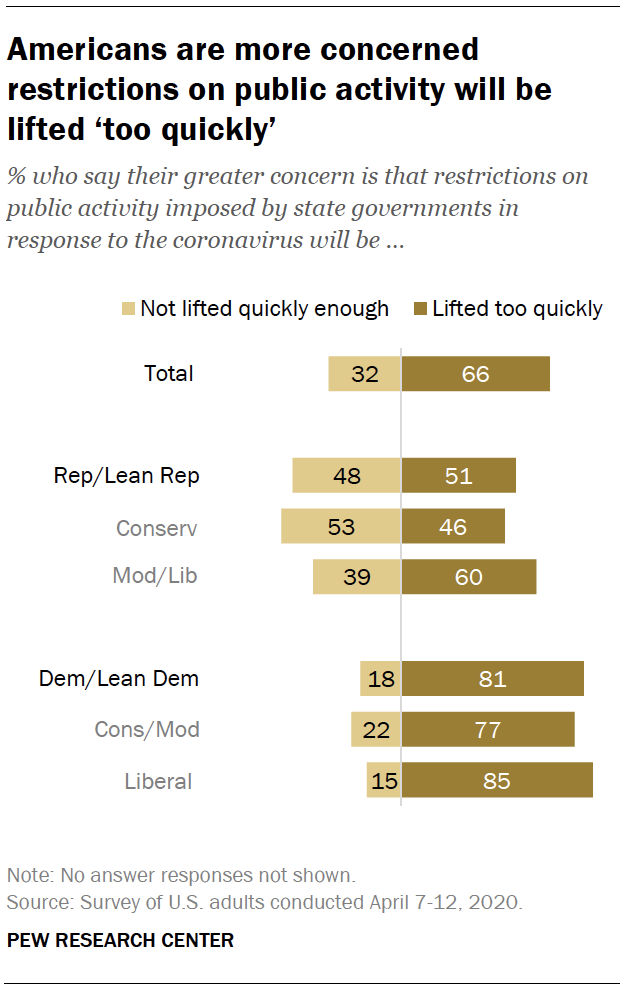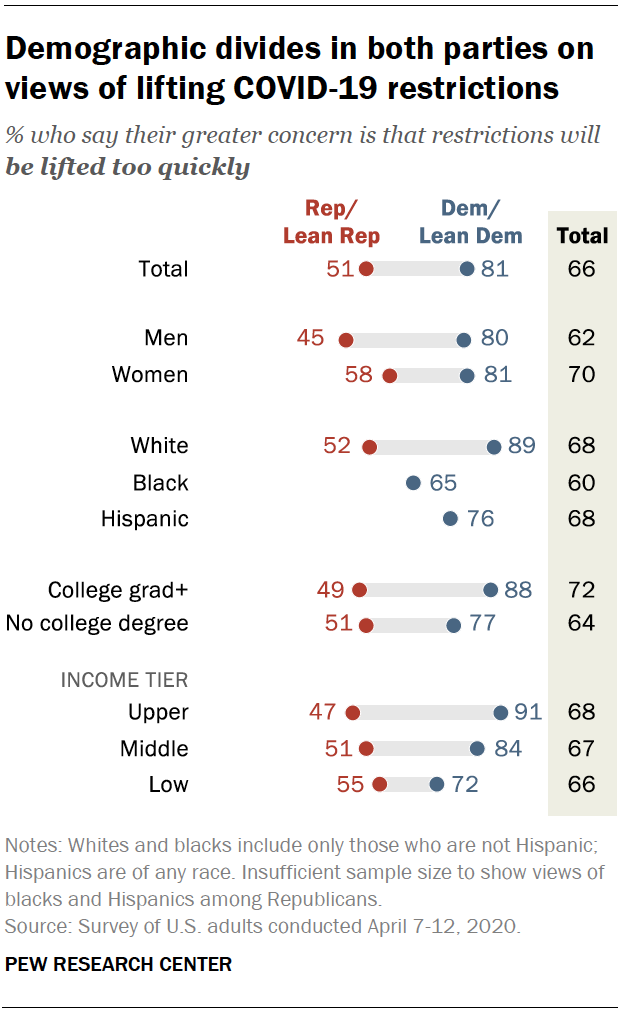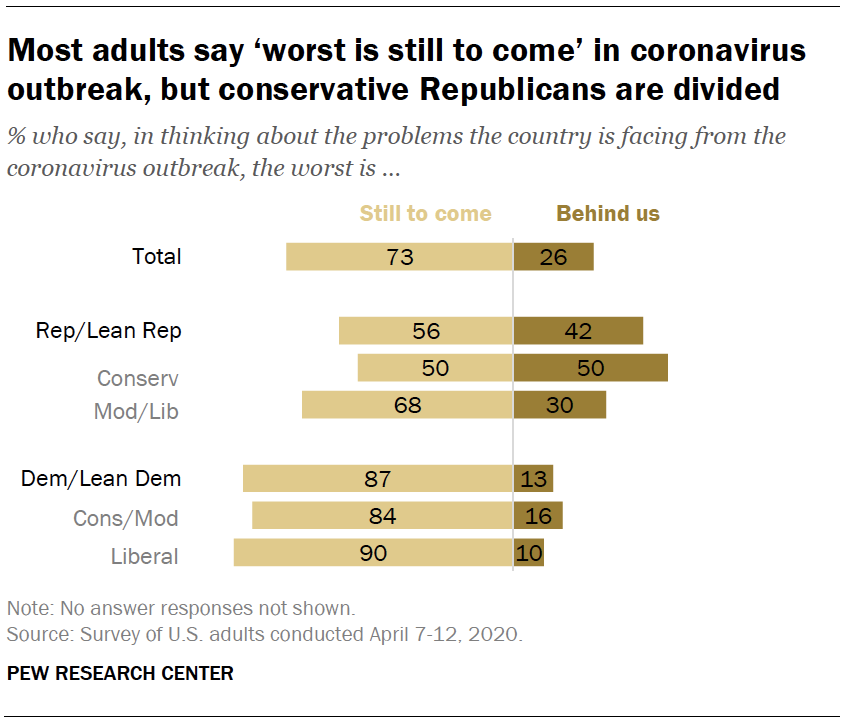With substantial limits in place on public activity in most states to combat the coronavirus outbreak, 66% of Americans say they are more concerned that these restrictions will be lifted too quickly, while 32% say they are more concerned they won’t be lifted quickly enough.
 But Republicans and Republican leaners are split over which is the greater concern: About half (51%) say they’re more concerned the restrictions will be lifted too quickly, while roughly the same share (48%) say they are more concerned they won’t be lifted quickly enough.
But Republicans and Republican leaners are split over which is the greater concern: About half (51%) say they’re more concerned the restrictions will be lifted too quickly, while roughly the same share (48%) say they are more concerned they won’t be lifted quickly enough.
Mirroring ideological divides on other coronavirus issues, conservative Republicans and moderate and liberal Republicans express slightly different concerns. A narrow majority of conservatives say they’re mostly concerned the restrictions won’t be lifted quickly enough (53%). But six-in-ten moderate and liberal Republicans say they’re more concerned they’ll be lifted too quickly.
About eight-in-ten Democrats and Democratic leaners (81%) say they’re more concerned restrictions will be lifted too quickly. This includes 85% of liberals and a slightly smaller share of conservatives and moderates (77%).
 There is a gender gap among Republicans in concerns about the speed of lifting restrictions, with GOP women considerably more likely than Republican men (58% vs. 45%) to say they’re concerned COVID-19 restrictions imposed by state and local governments will be lifted too early.
There is a gender gap among Republicans in concerns about the speed of lifting restrictions, with GOP women considerably more likely than Republican men (58% vs. 45%) to say they’re concerned COVID-19 restrictions imposed by state and local governments will be lifted too early.
While majorities of Democrats across demographic groups express more concern that public activity will resume too quickly, this view is more prevalent among white Democrats (89%) than among black (65%) or Hispanic (76%) Democrats.
College-educated Democrats are more likely to say they’re concerned restrictions will be lifted too early than those without a college degree (88% vs. 77%, respectively). In contrast, there is no such education gap among Republicans.
Similarly, higher-income Democrats are far more concerned than those with lower incomes about lifting restrictions too early. But among Republicans, there are more modest differences in views by income.
Nearly three-quarters say the worst is still to come in the outbreak
When it comes to the problems the country is facing from the coronavirus outbreak, 73% of U.S. adults say the worst is still to come, compared with 26% who say the worst is behind us. Majorities of both Republicans and Democrats say the worst is still to come. However, Democrats are much more likely to say this than Republicans.
Nearly nine-in-ten Democrats and Democratic leaners (87%) say the worst is still to come in the outbreak. This includes 84% of conservative and moderate Democrats and 90% of liberal Democrats. Each group represents about half of Democratic voters.
 A smaller majority of Republicans (56%) say the worst is still to come, while 42% of Republicans say the worst is already behind us. There are also sharper divisions among Republicans than among Democrats based on ideology.
A smaller majority of Republicans (56%) say the worst is still to come, while 42% of Republicans say the worst is already behind us. There are also sharper divisions among Republicans than among Democrats based on ideology.
Among moderate and liberal Republicans, 68% say the worst is still to come while three-in-ten say the worst is behind us.
Conservative Republicans, who make up about two-thirds of Republicans, are evenly divided: Half of conservative Republicans say the worst is behind us and half say the worst is still to come. By this measure, conservative Republicans are far more optimistic about the problems the country faces due to the outbreak than any other major demographic or political group.
Republicans – but not Democrats – also differ in their views based on age. Among Democrats, nearly identical percentages of those ages 18 to 49 (87%) and those ages 50 and older (86%) say the worst is still to come in the outbreak.
 Among Republicans, there are sharp differences between adults 50 and older and those younger than 50. Nearly two-thirds (64%) of 18- to 49-year-old Republicans and Republican leaners 18-to-49 years old say the worst is still to come, compared with 35% who say the worst is behind us. Among Republicans ages 50 and older, about half (51%) say the worst is still to come and about half (48%) say the worst is behind us.
Among Republicans, there are sharp differences between adults 50 and older and those younger than 50. Nearly two-thirds (64%) of 18- to 49-year-old Republicans and Republican leaners 18-to-49 years old say the worst is still to come, compared with 35% who say the worst is behind us. Among Republicans ages 50 and older, about half (51%) say the worst is still to come and about half (48%) say the worst is behind us.
Republicans ages 65 and older are also more optimistic than those 50-to-64. Among Republicans, a majority of those ages 50 to 64 (56%) say the worst is still to come, compared with 44% of those 65 and older.


 Data Tool: Survey Question on Trump's Response to COVID-19
Data Tool: Survey Question on Trump's Response to COVID-19